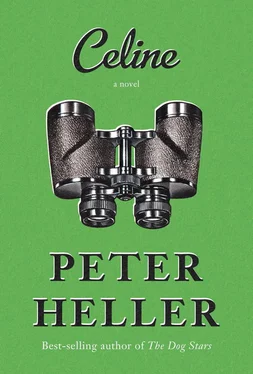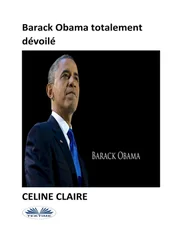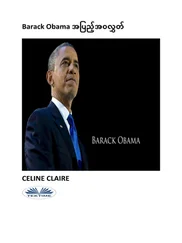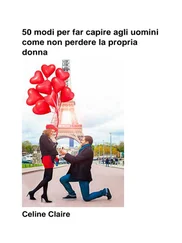“Look, Pete,” she said. “There’s a man fishing down there in the fog. It looks just like that poster of Hank’s.”
“Aye-yup.” Pa was speaking Maine this morning. Clearly the Washakie waitress in her reticence had reminded him of his first language.
They drove out into the open grass valley where a herd of elk in their hundreds grazed head down unafraid of bow hunters. “That’s the National Elk Refuge,” said Celine, pointing. “I remember all this. I took Mimi skiing here for her thirtieth birthday. I remember we rode a big cable car to the top—that mountain there, can you see it?—and once we got above the fog it was bright sun and blue blue sky, and as we neared the summit an announcement in the gondola said something about ‘If you are not an expert ride back down.’ It was glorious skiing up there, all those steep chutes. And down below the whole valley obscured by a layer of clouds. When we took our long run all the way to the bottom for lunch we skied right through that floor of clouds, right into mist and snow! We were like two little airplanes!”
“Mmm,” Pete hummed.
“You’re not listening to a thing I say this morning!” Celine cried, though she knew, of course, that this was not true.
“Hmph.”
“Hmph is right. We have good cell reception. When we get to town, I’m going to call Gabriela again.”
“Good idea.”
Suddenly they were at the edge of it, the bustling town. They wound past the rec center, the first ski shops and cafés, and entered the flow of traffic around the central square. The town was packed. Trucks loaded with kayaks and bikes, campers with fly-rod vaults on the roof. Everybody seemed to be on the way to Fun. A sunny cool September morning, bracing for real fall but unwilling to let go of summer, the kind of autumn day that can only occur a couple of weeks a year. Tourists posed for pictures at the corners of the square, beneath tall arches made of elk antlers, their big smiles not at all fake.
“You’d think it was Fourth of July,” Celine exclaimed. “Gracious! Don’t any of these people have jobs?”
“Hard to say.”
“Let’s pull over.” As soon as she said it, an SUV carrying a canoe began backing out of one of the prized parking spots. Right in front of them. Pete did not comment. This was another of his wife’s talents: She had Parking Angels.
They got out, stretched, walked slowly on stiff knees across the street to one of the antlered arches.
“Pete, wait a sec. Let me catch my breath here. It’s all the sitting. Can you please post this letter for me. It’s to Hank. There’s a box there.” What a nuisance, emphysema. She thought she was a long way from having to carry oxygen, but higher altitudes could make things difficult, especially when she was tired, which she was. Her sleep had been troubled after seeing that truck vanish into the mist. She hadn’t imagined it, and she was sure that whoever was driving the vehicle had been scouting them. God knows why.
Pete rejoined her and she glanced over her head at the gate of antlers. “Come the True Dreams through Gates of Horn,” she said.
Pete held her hand, barely. Moral support. “And False through the Gates of Ivory.” He looked up. “Definitely qualify as horn,” he said.
“Hmm. We’ll take it as a sign. Old Penelope was even wiser than her husband, don’t you think? Women usually are.” She gave Pete’s hand a squeeze, a sign that he could release her. “Let’s sit on that bench in the shade.” They did. Celine wore a small leather belt pack at her waist and she pried from it her flip phone. She called Gabriela, let it ring. Just before she thought it would go to voice mail the young woman picked up. Celine thought she had deliberated— Pick up or not pick up? —she could hear it in the sound of her “Hello?”
“Gabriela, hi, this is Celine. We are in Jackson on the way to Yellowstone. Are you well?”
“Fairly well. Yes.”
“And your son?”
“He’s—he’s at school. Yes.” She sounded nervous.
“Good. Before we get to Cooke City I’d like to know if you can locate your research file now. You know, it will be tremendously helpful.”
The conversation began in fits and starts, which was another clue. Celine pressed about the file. How on earth could she misplace it? What did that mean, anyway? Gabriela at first was evasive. She tried to sound upbeat and clueless—“God, I have no idea. I wonder if I left it in the coffee shop at the corner, I was going over it, trying to organize it before I copied it to send to you, I just don’t know. I’ve been by the place half a dozen times!”—and the more hapless she acted, the more seriously distraught she sounded.
“Just a sec,” Celine said. She stopped the girl in her tracks. She had no patience for a bad liar. A good liar, on the other hand, was someone to learn from. She dug back into her belt pack, pulled out a red plastic inhaler, and sprayed herself one, then two full doses and held them in her lungs. Pheeeeew she let them out through pursed lips. “There. Better.” She breathed two lungfuls of mountain air. “Now. I am an old woman, who knows how much time I have left. I certainly don’t have enough of the stuff to tolerate deceit from the ones who should be telling me the truth. Gabriela, can you tell me what in God’s name is really going on?”
Gabriela said she honestly didn’t know. That rang true.
“Okay, tell me,” Celine said.
“I—I don’t know if I can. Or should.”
“You are scared.”
“A little, yes.”
It was hard for Celine to imagine the intrepid bundle of energy she had met on the dock, the one with the clear laugh and the scent of blossoms, as frightened. Even the sadness that softened her seemed devoid of fear. “Well.” Celine waited. One beat, then two. “Is it that we are on the phone?”
“Yes. Maybe.”
Celine thought for a second. “You know,” she said finally, “there is probably nothing you can tell me now, about the file, that Whom It May Concern doesn’t already know.”
Gabriela laughed, nervously, but it relieved the tension. “Yes, I guess that’s true. Well, I put it on the coffee table in my apartment a week ago. To review, as I said. I went down to the athletic club on Mission for a yoga class and when I came back I couldn’t find it anywhere. I went out of my mind. I was sure I’d left it there. And—”
“Yes?”
“My picture of Amana was knocked over. The one on the ferry. It is never knocked over. It sits on its own shelf. Nick can’t even reach it. And in the kitchen, the silverware tray was over on the right side of the big drawer. I keep it on the left. And—”
“Go on.”
“That passport was gone.”
The phone was on speaker so that Pete could listen in. He had taken off his tweed cap and leaned his head in close, the side with the hearing aid. At twenty-two he had enlisted before he could be drafted for Korea, and though the war ended before he was ever shipped out, he went almost deaf on his right side from firing an M1C sniper rifle. He had been trained as a sniper, which was an odd specialty for a man with Pete’s gentle nature, but maybe not so odd when one takes into account his boyhood growing up on a Maine island and plinking groundhogs from impressive distances with a .22. Pete’s range instructors would have noticed it right away. His brother told Celine once that Pete could hit a flying chunk of two-by-four with a .22 just as if he were using a shotgun. A talent he never mentioned, which was not surprising as he never mentioned much.
Читать дальше













